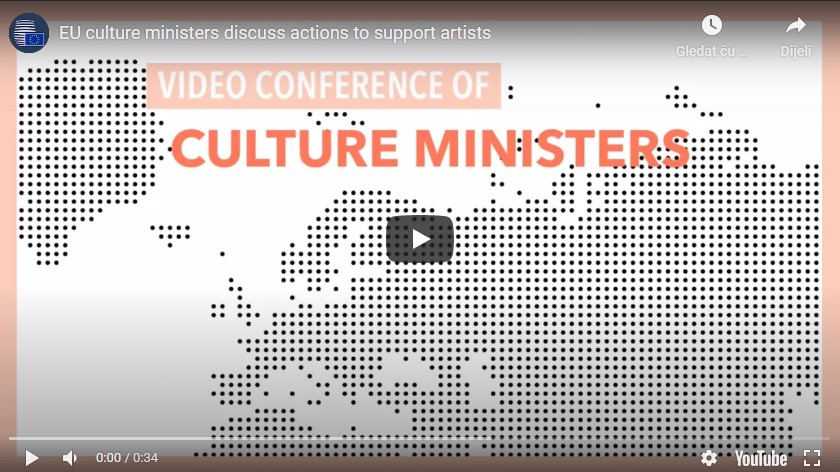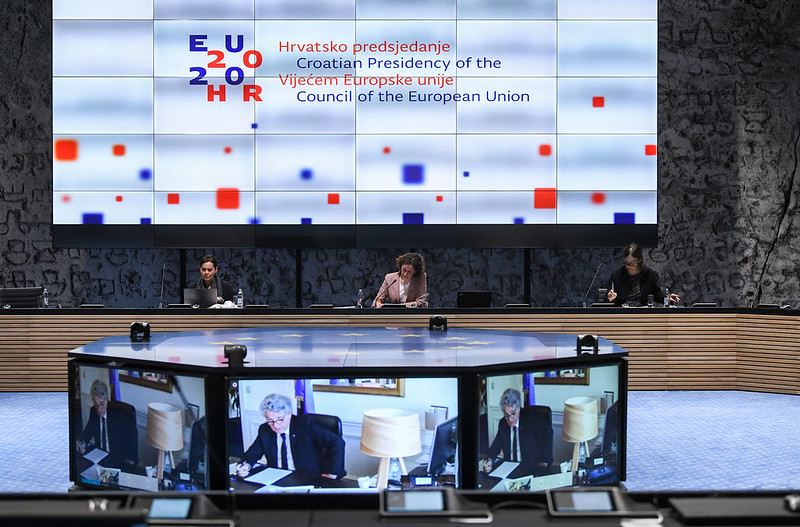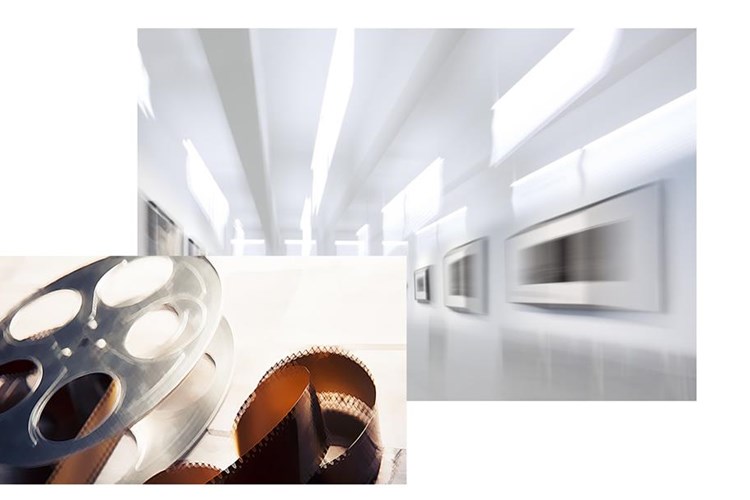The Government of the Republic of Croatia adopted a series of measures to assist the cultural sector in order to minimise the adverse effects of the COVID-19 pandemic
As part of the revised budget, the Ministry ensured 48.000.000,00 million Kuna (approximately 6.300.000,00 euros) for the Crisis Fund to help the cultural and media sector.
FIRST PACKAGE OF MEASURES ADOPTED IN THE PERIOD OF SUSPENSION OF ALL CULTURAL ACTIVITIES
As part of the Government's activities and in coordination with other departments, the Ministry developed the first package of measures that entered into force immediately after the announcement of restrictive measures:
- The decision on the postponement of the execution of the contracted programs of public needs in culture and the conditions of payment for approved programs in special circumstances
This measure allows a maximum of flexibility for contracted programs within the Ministry, the Croatian Audiovisual Center and the Foundation “Kultura Nova”. The measure insures a recognition of costs for the organization and an adapted structure of costs in order to ensure minimal liquidity in the cultural sector and prevent the collapse of the entire cultural value chain (creation, production, distribution and participation). This Decision ensured the retention of funds within the sector and enabled the payment for independent artists, part-time workers and those without permanent sources of income.
- The Decision on the suspension of the revision of freelance artists to the payment of contributions for pension and health insurance from the state budget for a period of six months
- First package of measures for job preservation implemented by the Croatian Employment Bureau
On 17 March, the Government adopted the first package of measures which applies to all citizens and legal entities. The Ministry of Culture and the Ministry of Labor and Pension System, in cooperation with the Croatian Employment Bureau, launched a measure to support job preservation which is also intended for entrepreneurs within the cultural and creative industries, including art organizations, as well as self-employed artists and journalists who pay contributions for pension and health insurance.
The Ministry issued a Decision suspending the payment of monument rent for natural and legal persons liable to pay monument rent pursuant to Articles 114 and 114a of the Law on the Protection and Preservation of Cultural Heritage, for the period from 21 May to 21 July 2020.
- Public call to support artists who professionally perform independent artistic activity and whose contributions are paid from the budget of the Republic of Croatia
Launched by the Ministry of Culture as a complementary measure to the measure of the Croatian Employment Bureau.
- Special fund for independent professionals who do not have a regulated status, are not in the register of taxpayers, do not pay contributions or have not acquired the right to pay contributions from the state budget
From this special fund one-time fees were paid to artists through artistic associations they are members.
In April 2020, following the Conclusion of the Government of the Republic of Croatia on measures to launch economic and other activities in the conditions of the declared COVID-19 epidemic, the reopening of archives, libraries, museums and galleries was initiated.
- Measures for the media sector
The measure of the Government aimed at preserving jobs also applied to media service providers.
The measure was adopted allowing the Agency for Electronic Media to carry out disbursements from the Fund for the Promotion of Pluralism and Diversity of Electronic Media for 2020, with the possibility of repurposing part of the Fund on the topic of public monitoring of the coronavirus epidemic and to enable the adaptation of the program bases of media service providers to special circumstances.
For media workers who weren't covered by this measure, the Electronic Media Council conducted a tender for the payment of aid for part-time media workers.
The Ministry made a Decision to support part-time media workers whose cooperation was canceled due to the COVID-19 epidemic.
In parallel with the measures taken to assist artists, the Ministry continued to publish and conduct public calls and tenders through which certain sectors are additionally co-financed or responding to identified shortcomings and needs in the field of culture: Public call for purchase of books for public libraries, Public call for encouraging musical creations, Public call for support of literary production in 2021, Public call for support of production in visual arts, and Public Call for proposals for programs that enable access to cultural content for persons with disabilities and children and youth with developmental disabilities.

THE SECOND PACKAGE OF MEASURES AIMED TO ENCOURAGE AND RESTART CULTURAL LIFE AS WELL AS THE PRODUCTION AND DISTRIBUTION OF CULTURAL AND ARTISTIC CONTENT
- On 18 May, the Ministry published the call Art and Culture Online, with a total grant of 25 million Kuna (approximately 3.300.000,00 euros).
The aim of the call is to finance activities of preparation and implementation of online artistic and cultural activities within the Operational Program Effective Human Resources 2014-2020.
- On 28 May, the Ministry launched a call Entrepreneurship in Cultural and Creative Industries which is focused on funding activities to adapt business models of production, distribution, availability and access to cultural and artistic content. The call covers the fields of performing arts, literature, publishing and book activities, visual arts and audiovisual activities. The total amount of funds is 8 million Kuna (1.050.000,00 euros).
- Additional funds had been provided for the co-financing of films through the Croatian Audiovisual center, in terms of providing the funds needed to comply with the recommendations of the Croatian Institute of Public Health.
- In June 2020, the Ministry issued the Decision on suspension of payment of financial compensation for 2020 for performing underwater activities in the internal sea waters and territorial sea of the Republic of Croatia in areas where cultural goods are located, due to the extraordinary circumstances.
- In July 2020, The Ministry of Culture and Media, the Ministry of Finance and the Croatian Agency for Small Business, Innovation and Investment (HAMAG-BICRO) cooperated on launching the loan guarantee program for entrepreneurs (SMEs) active in the field of culture and creative industries, based on the European Commission's Temporary Framework for State Aid measures. The measure envisages a total of around 300 million Kuna (39.826.617,93 EUR). Entrepreneurs not founded by a public authority will be able to take out loans amounting up to 800.000 EUR, with a 100% guarantee provided by the Croatian Government.
- In September 2020, the Ministry of Culture and Media opened an adjusted version of the Call for submitting programmes of public needs in culture. Taking into consideration current epidemiological circumstances, which pose a challenge for the planning, implementation and general availability of programmes as well as the mobility of artists and cultural professionals, all applicants were advised to submit such programme proposals that would be possible to implement while respecting epidemiological restrictions in force and in line with all particularities relevant to the cultural field their application belongs to.
- In October 2020, the Croatian Audiovisual Centre issued the Decision on implementing the decision on additional support for production of debut feature films and feature films that could not be produced due to the economic effects of the COVID-19 pandemic.
- Consultations are made with the organizers of events and festivals, as well as all other beneficiaries of support from the Ministry of Culture in order to approve new programs and budgets.
- Discussions are also in the process on the possible extension of support for those activities that cannot be launched until all restrictions have been lifted, and concern primarily the performing arts and the cinema industry.
THE THIRD PACKAGE OF MEASURES - IN THE AUTUMN 2020, THE MINISTRY OF CULTURE AND MEDIA WILL INITIATE FOUR NEW SUPPORT PROGRAMMES TO BE REALIZED BY THE END OF THE YEAR
- Additional funding has been allocated to support film production and the grants will be awarded by the Croatian Audiovisual Centre pursuant to criteria developed by the Centre. The Decision on implementing the decision on additional support for production of debut feature films and feature films that could not be produced due to the economic effects of the COVID-19 pandemic was issued by the Croatian Audiovisual Centre in October 2020.
- The Ministry of Culture and Media has opened a Public call for partial compensation of performance costs in theatre, dance and music (classical and jazz music) with the aim of stimulating further activity in performing arts, within the current circumstances of reduced spatial capacities and the consequent inability to meet all performance costs.
- The Ministry of Culture and Media has opened a Public call for digital adjustment programmes and the creation of new cultural and educational content to admit applicants across all cultural disciplines (audiovisual production, performing arts, literature and translation, visual arts). This call is aimed at providing earmarked funds to professionals in arts and culture (arts organizations, professional associations in culture, independent artists, independent professionals in arts and culture), whose work has been made impossible to carry out or severely impeded.
- The Croatian Musicians Union has published a Call for proposals for concert programs under the Agreement with the Ministry.
- In January 2021, The Ministry of Culture and Media has opened a new Public call to support artists who professionally perform independent artistic activity and whose contributions are paid from the budget of the Republic of Croatia.
- In February 2021, The Ministry has launched a Public call for independent professionals who do not have a regulated status, are not in the register of taxpayers, do not pay contributions or have not acquired the right to pay contributions from the state budget. Through this Public call artists will achieve a right for one-time fees through artistic associations they are members.

RECAPITULATION RELATED TO THE RELAXATION
OF MEASURES AND THE NEED FOR ADAPTATION
AND ACTION IN NEW CIRCUMSTANCES
As the epidemiological situation was improved, the Ministry, in coordination with the Civil Protection Headquarters, the Croatian Institute of Public Health and other cultural stakeholders whose work was disabled due to the establishment of preventive measures, developed a series of recommendations for the realisation of artistic activities, which contributed to the production, distribution and use of cultural content.
As part of the relaxation of measures, the Government has decided that libraries, bookstores, museums, archives, galleries and antique shops can open from 27 April. From 11 May, it is possible to hold rehearsals in theaters.
On 15 May, the Croatian Institute of Public Health published Recommendations for the Prevention of COVID-19 Disease During Professional Art Performances, Cultural Programs and Events, and Recommendations for the Production and Recording of Audiovisual and Music Content During the COVID-19 Disease Epidemic that allow performances and recordings indoors as well as outdoors.
In August 2020, based on the cooperation with the Ministry of Culture and Media, the Croatian Institute of Public Health issued the Recommendations for the prevention of COVID-19 disease in multiplex cinema in shopping malls, enabling the relaunch of the cinema industry.
Following this decision, the Croatian Audiovisual Centre (HAVC) launched a campaign together with the Croatian Independent Cinemas Network, promoting the return of viewers into cinemas. The campaign entitled Povratak u kino! (Back to Cinema!) began in August and takes place throughout September through screenings of Croatian hit films from different periods.
In constant consultation with the Croatian Civil Protection and through consultations and exchange of experiences at the European level, the Ministry will continue to monitor the situation and respond to it, providing support to artists in order to preserve the chain of cultural values.
-
EU and international cooperation

Culture and audiovisual: the Council adopts conclusions on risk management in the area of cultural heritage, media literacy and the amendment of the Work Plan for Culture (2019 - 2022)
26 May 2020 - The Council adopted by written procedure three sets of conclusions in the area of culture and audiovisual.
The conclusions on media literacy in an ever-changing world recognise the importance of media literacy given the growing exposure of citizens to a large amount of disinformation, in particular during global crises such as the current COVID-19 outbreak. Member states are invited to undertake various measures, such as developing lifelong-learning approaches to media literacy for all ages. The crucial importance of quality journalism and the need to identify more effective solutions in the fight against disinformation, while protecting freedom of expression, are among the important aspects tackled by these conclusions.
The conclusions amending the Work Plan for Culture (2019-2022) reiterate that promoting sustainable development is a key action for the European Union's future in the Strategic Agenda 2019 - 2024 and amend the plan to give priority to culture as a driver of sustainable development.
>>> Culture and audiovisual: the Council adopts conclusions on risk management in the area of cultural heritage, media literacy and the amendment of the Work Plan for Culture (2019 - 2022)


On 19 May 2020, Croatian Minister Nina Obuljen Koržinek chaired a videoconference of EU Ministers of Culture and Audiovisual, with the participation of the European Commissioner for Innovation, Research, Culture, Education and Youth Mariya Gabriel.
The focus of the videoconference was on the consequences that the COVID-19 crisis continues to have on the cultural and creative sectors. The ministers shared their plans regarding next steps that should be taken in the context of re-opening of cultural venues and restart of artistic events and productions.

Ministers discussed the ongoing impact of the crisis on the cultural and creative sectors and the possible ways to re-engage artists and audiences in a new social and economic circumstances.
"As all parts of cultural sector have been affected by the crisis, the effects of which will be long-lasting, we feel urgency to react by adapting our policies and financing schemes to changing circumstances. The period ahead of us carries many unknowns, and a continuous exchange of information, as well as careful mapping and planning of further activities, are of the utmost importance. This will ensure appropriate conditions for our further work, in particular in the context of the “new normal” at the EU level." - Nina Obuljen Koržinek Minister of Culture
Ministers exchanged views on the results of the implementation of the first set of measures and the prospective steps considering progressive removal of restrictions that will allow cultural activities across Europe to resume. They also discussed about lessons learnt since the beginning of the crisis and the subsequent potential changes in the cultural and creative environment.
In addition, ministers emphasized the need to come up with a joint European approach which will respond to the requirements of the sectors and to apply maximum flexibility in the implementation of the Creative Europe programme and its future in the next seven-year period, related to its implementation and financing, especially in view of the level playing field.
Ministers highlighted media literacy as a key component in fighting against fake news and disinformation and also reminded of the importance of freedom of press, vital role of journalists and credible and fact-based reporting.
Ministers of Culture and Media discussed measures aimed at assisting the cultural and creative sector
In parallel, discussions between EU stakeholders and on the global level, on the modalities of assistance for the cultural and creative sector are taking place.
On the initiative of Minister Nina Obuljen Koržinek, within the Croatian Presidency of the Council of the European Union, on 8th April a videoconference was organized in order to discuss measures aimed at assisting the cultural and creative sector.
The meeting gathered EU Ministers of Culture and Media, as well as Věra Jourová, Vice President of the European Commission and Commissioners Mariya Gabriel and Thierry Breton. In this period, the European Commission assured funding through the European Social Fund, Cohesion Fund, State Aid model, SURE model, and stressed the necessity of flexible approach to the beneficiaries of the Creative Europe programme.

Photo: Josip Regovic/PIXSELL/EU2020
"Today's discussion showed that all Member States have undertaken the necessary steps in order to help artists, cultural workers, cultural institutions and companies in the cultural and creative industries in situation when cultural events are being postponed or cancelled. We also discussed how the public consumes cultural content on various online platforms during the isolation.
We are all faced with the same challenges and I am convinced that the results of today's debate will help us to cope with this crisis and its consequences on culture, both at the European level and in Member States.“
- Nina Obuljen Koržinek
Global movement “ResiliArt”
UNESCO launched a global movement called “ResiliArt”, a series of online debates with the aim to raise awareness about the far-reaching consequences of COVID-19 across the sector and support artists during and following the crisis.Minister Obuljen Koržinek participated in the first panel co-organised with the International Confederation of Societies of Authors and Composers (CISAC) and once again emphasized the responsibility of Ministers of culture in developing actions to help artists who, due to new circumstances, are unable to continue their work.

